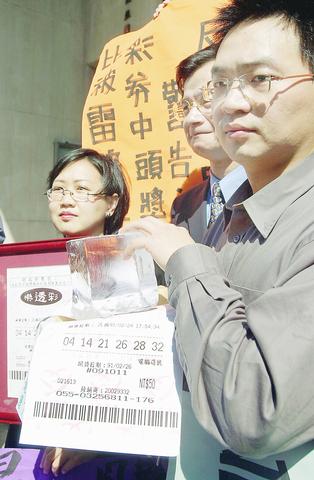While legislators urge the government to reduce the number of Public Welfare Lottery draws from two a week to one, scholars are also condemning the media's coverage of the lottery.
Vice President Annette Lu (
The finance committee of the Legislative Yuan last week asked the Ministry of Finance to take steps to ease public hysteria about the lottery, by publishing warnings on lottery tickets about the low probability of success and the dangers of excessive expenditure on lottery tickets, and reducing the draws to one a week.

PHOTO: CHIANG YING-YING, TAIPEI TIMES
Some critics, however, say that the lottery fever is whipped up by the media.
"The media are responsible for reporting what readers and audiences care about, but I doubt whether the lottery is worth 24-hour broadcast coverage and special-report newspaper pages," said Chen Ping-hung (
The public lottery was first drawn on Jan. 22 and has since received saturation coverage by the media. All cable news channels broadcast the draws live every Tuesday and Friday evening and report 24-hours a day on related stories, including items about stations that have sold lucky tickets and people who have predicted winning numbers.
The print media are also providing saturation coverage. Of these, the China Times Express, one of the three main evening newspapers, is alone in offering predictions of winning numbers, which it has done in its four-page special reports on the lottery every Tuesday and Friday since Jan 18. It said in its first report that "Becoming rich is humanity's dream, becoming rich is an activity for the whole people."
It added, "The China Times Express will help you to find the miraculous key to wealth from analysis of scientific statistics and mysterious metaphysics."
As well as purporting to predict lucky numbers, the four-page special reports also advise on "magical phenomena" that they say can forecast lucky numbers.
One of the newspaper's news reports in its Jan. 24 edition effectively promoted its special pages by reporting their accurate prediction of five of the six lucky numbers in one of the previous draws.
Professor Hu Yu-wei condemned the newspaper, saying that only people who had not progressed beyond a very low level of education would believe that lottery numbers could be predicted.
"The decision to print special reports on the lottery is a high-risk one. Audiences will eventually realize that newspapers can't predict lucky numbers and the newspaper will not only lose its credibility but also its reputation and standing in society," Hu said.
"It's ironic that newspapers criticize the lottery, even as they devote extensive space to covering it," Hu added.
The China Times, the China Times Express' sister paper called on the government in its Feb. 20 "Observer" column to take responsibility for easing the so-called "lottery fever" and its negative consequences, which have included at least one suicide -- an unemployed customer who spent his entire savings of NT$25,000 on the lottery, without winning a penny.
The China Times' Feb. 22 edition included a report on the negative impact of the lottery on Taiwan's shrinking consumer goods market.
Ma Yung-jen (
"We think the lottery fever needs to be eased. Twice-weekly draws are too frequent. The lottery has had more and more negative side-effects. We'll stop reporting secondary stories about the lottery," Ma said.

The Ministry of Education (MOE) is to launch a new program to encourage international students to stay in Taiwan and explore job opportunities here after graduation, Deputy Minister of Education Yeh Ping-cheng (葉丙成) said on Friday. The government would provide full scholarships for international students to further their studies for two years in Taiwan, so those who want to pursue a master’s degree can consider applying for the program, he said. The fields included are science, technology, engineering, mathematics, semiconductors and finance, Yeh added. The program, called “Intense 2+2,” would also assist international students who completed the two years of further studies in

The brilliant blue waters, thick foliage and bucolic atmosphere on this seemingly idyllic archipelago deep in the Pacific Ocean belie the key role it now plays in a titanic geopolitical struggle. Palau is again on the front line as China, and the US and its allies prepare their forces in an intensifying contest for control over the Asia-Pacific region. The democratic nation of just 17,000 people hosts US-controlled airstrips and soon-to-be-completed radar installations that the US military describes as “critical” to monitoring vast swathes of water and airspace. It is also a key piece of the second island chain, a string of

Taiwan will now have four additional national holidays after the Legislative Yuan passed an amendment today, which also made Labor Day a national holiday for all sectors. The Chinese Nationalist Party (KMT) and Taiwan People’s Party (TPP) used their majority in the Legislative Yuan to pass the amendment to the Act on Implementing Memorial Days and State Holidays (紀念日及節日實施辦法), which the parties jointly proposed, in its third and final reading today. The legislature passed the bill to amend the act, which is currently enforced administratively, raising it to the legal level. The new legislation recognizes Confucius’ birthday on Sept. 28, the

A magnitude 5.9 earthquake that struck about 33km off the coast of Hualien City was the "main shock" in a series of quakes in the area, with aftershocks expected over the next three days, the Central Weather Administration (CWA) said yesterday. Prior to the magnitude 5.9 quake shaking most of Taiwan at 6:53pm yesterday, six other earthquakes stronger than a magnitude of 4, starting with a magnitude 5.5 quake at 6:09pm, occurred in the area. CWA Seismological Center Director Wu Chien-fu (吳健富) confirmed that the quakes were all part of the same series and that the magnitude 5.5 temblor was